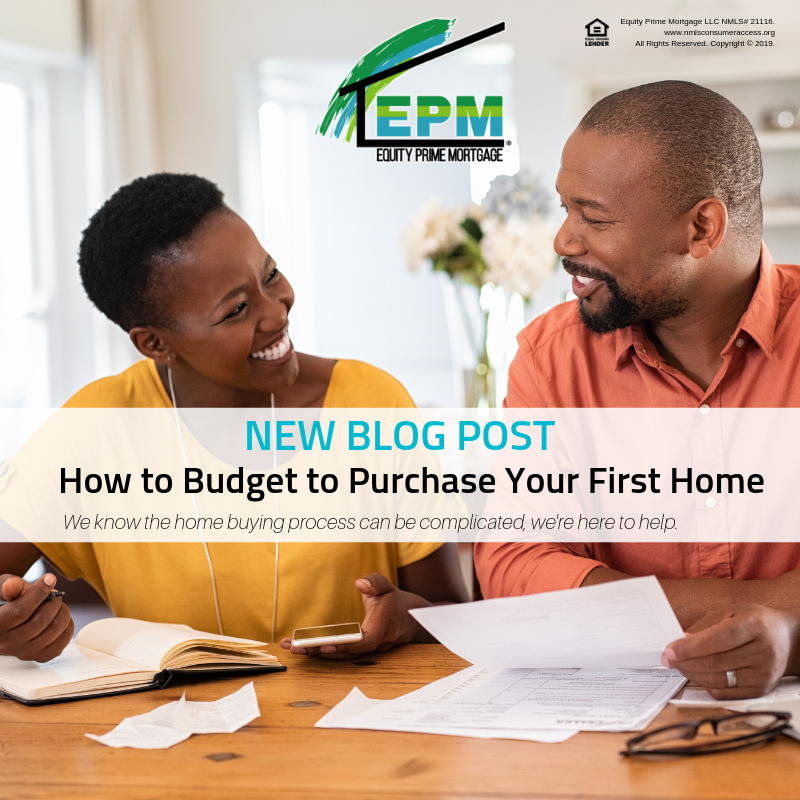How to Budget to Purchase Your First Home

Posted by Eric Skates on
Budgeting to buy your first home is not a difficult process. To create your homebuyer budget, you need to figure out your income, expenses, and savings target. Once you have those numbers, you can decide how to adjust your budget to purchase your home.
List Your Monthly Income
Your first step is to figure out how much money you have to work with. Add all sources of after-tax income your household receives in a typical month. In addition to paychecks for you and your spouse, you should include smaller sources of income like money earned in the gig economy. Your income table may look something like this:
Your paycheck: $3,000
Spouse's paycheck: $2,000
Spouse's freelance income: $250
Total monthly income: $5,250
Total Your Expenses
Next, you need to know how much you're spending each month. Here's a way to get an accurate picture of your expenses. For one month, keep your receipts for everything you buy with cash. When the month is over add up the receipts. Next, take a look at the statements for your debit and your credit cards to see how you spent that month using those. Finally, if you still write checks, don't forget to add in those expenses. When you've completed this exercise, you should have a line like this for your budget sheet:
Monthly expenses: $5,000
Categorize Your Expenses
Before you put away your cash receipts, credit card statements, and bank statements, use the information from them to categorize your expenses. While expenses vary from household to household, the following are common expense categories.
Rent: $1,300
Utilities: $500
Groceries: $600
Meals away from home: $150
Pet food: $50
Charitable giving: $500
Car Payment: $300
Personal care: $250
Credit card payments: $200
Student loans: $350
Car insurance: $125
Entertainment: $150
Retirement account savings: $200
Gym membership: $25
Healthcare: $250
Savings: $300
How Much Do You Need to Save?
Most homebuyers need to save up for the down payment on their home. How much you need to save depends on factors like the home's cost and the type of mortgage you're using to pay for it. Typically, your down payment is at least three percent of the home's purchase price. Although there are mortgage loans that require a down payment as large as 20 percent, lenders like Equity Prime Mortgage LLC have enough mortgage options to find one that meets your needs.
Here's an example to help you figure out how much you need to save. Let's say you plan to purchase a home for $240,000. Three percent of that amount, which is $7,200, is your minimum savings target.
Adjust Your Budget to Save
Now that you know your income, expenses, and savings target, it's time to decide if you need to adjust your budget to save. First, divide your savings target by how much you're currently saving each month toward your down payment. The answer is the number of months it will take for you to save your down payment if you don't change your spending or income.
In our example, we needed to save $7,200 and $300 is being put aside each month. Therefore, we can divide 7200 by 300 to see how long we have to save. At that rate, it will take 24 months (2 years) to save up for the down payment.
If the number of months you need to save is not acceptable to you, your options are to reduce your expenses, increase your income, or both. Many homebuyers find lowering their expenses is easier than increasing income. While there are many ways to cut down on what you spend each month, you may want to consider these ideas:
- Replacing cable TV with a cheaper streaming service
- Calling your credit card companies to ask for a lower interest rate
- Finding a better deal for cell phone service
- Eating out less often
- Shopping around for less expensive car insurance
At Equity Prime Mortgage LLC, we're available to help you with your mortgage needs. Whether you're ready to apply for your mortgage or just need more information about the home buying process, contact us today.



